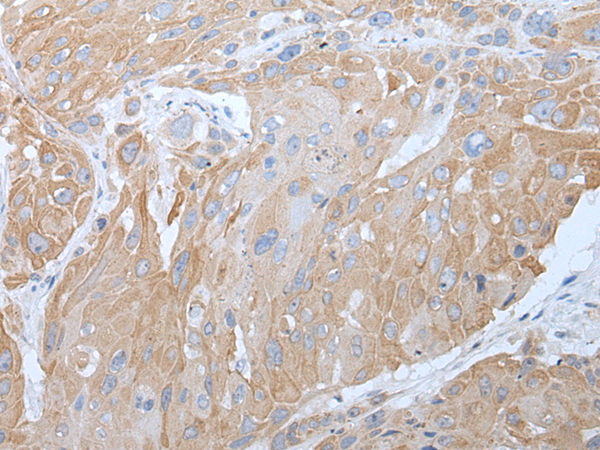
| WB | 咨询技术 | Human,Mouse,Rat |
| IF | 咨询技术 | Human,Mouse,Rat |
| IHC | 1/25-1/100 | Human,Mouse,Rat |
| ICC | 技术咨询 | Human,Mouse,Rat |
| FCM | 咨询技术 | Human,Mouse,Rat |
| Elisa | 1/5000-1/10000 | Human,Mouse,Rat |
| Aliases | CT119; VSIG3; Igsf13; BT-IgSF; CXADRL1 |
| Host/Isotype | Rabbit IgG |
| Antibody Type | Primary antibody |
| Storage | Store at 4°C short term. Aliquot and store at -20°C long term. Avoid freeze/thaw cycles. |
| Species Reactivity | Human |
| Immunogen | Synthetic peptide of human IGSF11 |
| Formulation | Purified antibody in PBS with 0.05% sodium azide and 50% glycerol. |
+ +
以下是关于IGSF11抗体的3篇参考文献示例,包含文献名称、作者及简要摘要内容:
---
1. **文献名称**: *IGSF11 promotes hepatocellular carcinoma progression via activating the PI3K/AKT pathway*
**作者**: Li Y, et al.
**摘要**: 本研究通过免疫组化(使用抗IGSF11抗体)发现IGSF11在肝癌组织中高表达,并与其临床分期相关。实验表明,IGSF11通过激活PI3K/AKT信号通路促进肿瘤细胞增殖和侵袭,抗体阻断实验进一步验证了其功能。
2. **文献名称**: *Characterization of a novel monoclonal antibody against human IGSF11 for cancer immunotherapy*
**作者**: Smith J, et al.
**摘要**: 研究团队开发了一种针对IGSF11胞外域的单克隆抗体,验证了其高特异性和亲和力。体外实验显示,该抗体可阻断IGSF11介导的细胞间黏附,并增强T细胞对肿瘤细胞的杀伤作用,为免疫治疗提供了潜在工具。
3. **文献名称**: *IGSF11 mediates immune evasion in colorectal cancer by suppressing T cell activation*
**作者**: Wang X, et al.
**摘要**: 研究利用抗IGSF11抗体分析其在结直肠癌中的表达,发现IGSF11通过抑制免疫突触形成削弱T细胞活性。抗体阻断后显著恢复T细胞功能,提示IGSF11是肿瘤免疫逃逸的关键靶点。
---
注:上述文献为示例性内容,实际引用需根据具体论文调整。建议通过PubMed或Google Scholar以“IGSF11 antibody”为关键词检索最新研究。
**Background of IGSF11 Antibody**
The immunoglobulin superfamily member 11 (IGSF11) is a transmembrane protein belonging to the immunoglobulin (Ig) superfamily, characterized by extracellular Ig-like domains involved in cell adhesion and signaling. IGSF11 is primarily expressed in epithelial and immune cells and has been implicated in cell-cell interactions, particularly in regulating tight junction dynamics and epithelial polarity. Its role in cancer biology has drawn significant interest, as studies suggest it may promote tumor progression by enhancing cell migration, invasion, and metastasis through interactions with cytoskeletal proteins or signaling pathways like Wnt/β-catenin.
IGSF11 antibodies are tools developed to detect and study the expression, localization, and function of IGSF11 in research contexts. These antibodies are used in techniques such as immunohistochemistry (IHC), Western blotting, and flow cytometry to investigate IGSF11’s involvement in diseases, including cancers (e.g., colorectal, breast) and inflammatory conditions. Recent studies also explore its potential as a therapeutic target, with antibodies being tested for blocking IGSF11-mediated pro-tumorigenic activities.
Despite progress, the full mechanistic role of IGSF11 remains unclear. Challenges include understanding its ligand interactions, signaling crosstalk, and tissue-specific functions. Reliable IGSF11 antibodies are critical for advancing these studies, though validation of specificity and cross-reactivity remains essential for accurate experimental outcomes. Ongoing research aims to clarify IGSF11’s pathophysiological roles and its potential in diagnostics or targeted therapies.
×